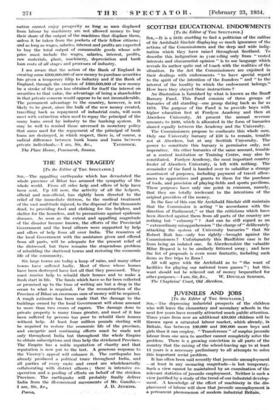SCOTTISH EDUCATIONAL ENDOWMENTS
[To the Editor of THE SPECTATOR.} SIR,—It is a little startling to find a politician of the calibre of Sir Archibald Sinclair displaying so much ignorance of the actions of the Commissioners and the deep and wide indig- nation which they have raised throughout Scotland. To describe this indignation as rim .vding only from " vested interests and obscurantist opinion " is to use language which reveals its author quite out of touch with the realities of the situation. In the Act the Commissioners are enjoined in their dealings with endowments " to have special regard to the spirit of the intention of the founders " and " to the interest of the locality to which the endowment belongs." How have they obeyed these instructions ?
An illustration is furnished by what is known as the Banff Bursary Fund. This Fund consists of three groups of bursaries of old standing—one group dating back as far as 1678. The purpose of the Fund is to provide boys with higher education first at Fordyce Academy and then at Aberdeen University. At present the annual revenue amounts to £800, which is allocated in the form of bursaries shared equally between the Academy and the University.
The Commissioners propose to confiscate this whole sum. Only one University bursary of 250 is to remain, tenable not at Aberdeen, but at any Scottish University. The power to constitute this bursary is permissive only, not imperative. Six other bursaries of the same amount, tenable at a central institution or Training Centre, may also be constituted. Fordyce Academy, the most important country feeder of Aberdeen University, is left with nothing. The remainder of the fund is handed over to subsidize a strange assortment of purposes, including payment of travel allow- ances to apprentices and grants to them for the purchase of tools, and provision of playing-fields and sports pavilions. These purposes have only one point in common, namely, that they are totally irrelevant to the intentions of the original providers of the money.
In the face of this can Sir Archibald Sinclair still maintain that the Commission is acting " in accordance with the direction of Parliament," or that the criticisms which have been directed against them from all parts of the country are nothing but " calumny " ? And can he still regard as an " extraordinary misapprehension " the charge of " deliberately attacking the system of University bursaries " that Sir Robert Rait has—only too rightly—brought against the Commissioners ? Unfortunately this Banffshire case is far from being an isolated one. In Aberdeenshire the valuable Milne Bequest is to be similarly frittered away ; and here the list of proposals is even more fantastic, including such items as free trips to Zoos
All will agree with Sir Archibald as to " the want of facilities for playing our national team games " ; but this want should not be relieved out of money bequeathed for
















































 Previous page
Previous page